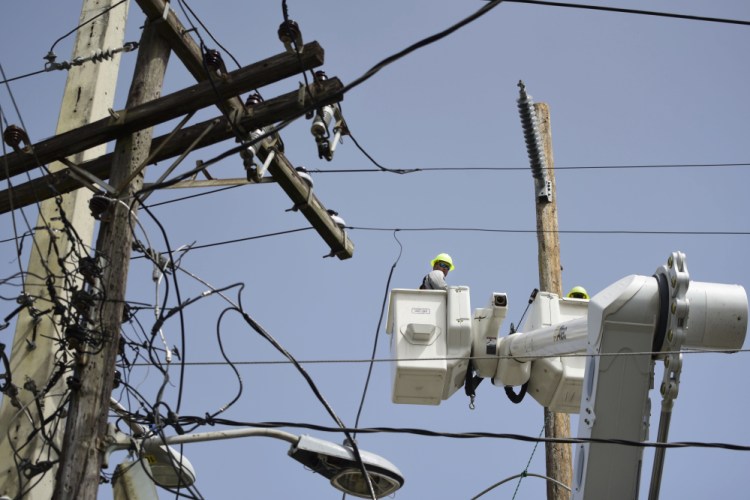A Maine solar energy company is building emergency equipment for parts of Puerto Rico still without power two months after a powerful hurricane devastated the island.
ReVision Energy has partnered with a national solar electricity cooperative and international relief organization to build and deploy dozens of portable trailers outfitted with solar panels to provide emergency power.
“There are still hundreds of thousands of people who do not have any power whatsoever,” said ReVision co-founder Phil Coupe. “They are not expected to get power for a long time. This will come in very handy for the folks who have been without electricity for so long.”
Called “solar outreach systems” – or SOS – the 12-foot-long trailers are equipped with six solar panels that can be folded onto the trailer body. The small systems will generate enough power to charge cellphones, lights, radios and laptop computers.
“This is going to be supplemental emergency power for basic lighting, small electronics, communications,” Coupe said. “We won’t be able to run buildings.”
Hurricane Maria, a Category 4 storm, blew through Puerto Rico on Sept. 20, ruining the island’s electricity grid and leaving millions without power and clean water. As of Monday, about 47 percent of Puerto Rico had electricity, according to the Puerto Rico Electric Power Authority.
ReVision will install solar cells on trailers at its North Andover, Massachusetts, warehouse before shipping them to Puerto Rico. The Aireko Foundation, a wing of Puerto Rican Aireko Energy Solutions, will deploy the systems. ReVision has offices in Portland and Liberty in Maine, and in Brentwood and Concord, New Hampshire.
ReVision plans to outfit 10 systems initially, and 100 in total. It may take three to six months to finish building all the planned units, Coupe said.
Although Puerto Rican authorities and the U.S. Army Corps of Engineers hope to restore power generation to most of the island by the end of the year, the ReVision systems will be important resources because they can be redeployed to other places that need emergency power, Coupe said. The systems will be loaned to communities for as long as they’re needed.
“Based on the level of damage that we are getting reports on, these things will be useful for a year or more,” he said.
The panels and trailers were initially provided by Amicus, a solar purchasing cooperative based in Colorado. ReVision and Aireko are Amicus members.
“It is a 100 percent volunteer donation. Nobody is getting paid,” Coupe said.
The systems will provide relief, but also showcase solar power’s ability to provide reliable power in areas prone to harsh weather and widespread power loss, including Maine, Coupe said.
ReVision and other companies are increasingly being asked to build solar systems with battery storage for emergency power during weather events like the windstorms that knocked out power to almost 500,000 Maine homes and businesses in late October.
“We are preparing for a climate where bad weather events are getting worse all the time,” Coupe said. “In that environment, a utility grid infrastructure with poles and wires is extremely vulnerable. Systems with power regeneration and batteries are proving to be resilient to those events.”
Send questions/comments to the editors.




Comments are no longer available on this story